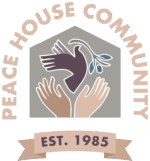Mission and Vision
Mission
Peace House Community (PHC) nourishes its members’ bodies and souls by providing a safe space for everyone. PHC enriches the lives of its members, volunteers and students by offering a place to belong for everyone who comes through its doors.
Vision
Community members who have been wounded by economic and social dislocation will be healed through caring relationships in a supportive community.
Guiding Principles
Peace House Community uses the following guidelines to maintain its founding principles:
- Ensure all voices are given an opportunity to express themselves.
- Respect the diversity of opinions and experiences in the community.
- Listen to other people with a mind that is open to wisdom from all sources.
- Practice non-violence through self-restraint, encouraging words, compassionate actions and respectful listening.
- Accept difficult situations with grace and serenity as we work towards conflict resolution.
Making a Difference?
Nourishing the bodies and souls of economically challenged and marginalized women and men in the Twin Cities since 1985.
The community members know that at Peace House Community they will be honored as human beings, known by their names, and not judged because of how they look, their mental health, or what they have done in the past. Peace House Community is a place of safety and respite from the streets.
PHC is unusual in the homeless service world in that it does not have any programming aimed at ending homelessness itself. We encourage all efforts to end homelessness and fully support the work of other agencies that offer housing to community members, but we recognize that expanding into housing provision could jeopardize our current mission. PHC does not require community members to answer invasive questions about their mental health status, criminal history, income or other information required for housing background checks. Instead, it offers a place of sanity and calm where community members decide for themselves what they want to share about their lives. Homelessness is never easy and has been recognized as a contributing factor to substance abuse addiction and mental illness. PHC addresses this by supporting community members’ mental, emotional and social health.
Our Services
PHC serves over 17,000 meals a year and hosts over 29,000 community member visits. Each year, your donations also provide:
- 200 hand massages
- 80 manicures
- 120 bike repairs
- 170 haircuts
- 100 neck and back massages
Additional services we provide referrals to:
- Housing
- Medical
- Social Security
- VA
- GA
Find out when specific services are offered on our Events calendar. To learn more about what Peace House offers, visit Our Community page.
If you do not see the services here that you need, please call 211 or click here.
Leadership and Staff
Peace House Community truly needs a village to keep its doors open. Since 1985, volunteers have shown up to use their talents and passion to keep us moving forward.
About Our Leadership
The ministry continues to operate with an all-volunteer Board of Directors, all-volunteer Leadership Team, and approximately 40 volunteers in total.
In addition, we have an Executive Director who oversees our community partnerships, staffing, and our relationships with our supporters. Our Program Director supervises our day-to-day operations, and the rest of the staff ensures that we provide a great place for our community members to pass the day.
The board members have proven experience in areas of nonprofit administration, finance, legal, spirituality, and volunteer development.
With the contribution of community members and all volunteers, Peace House Community developed and maintains a three-year strategic plan that guides the organization’s work.
Director
Marti Maltby joined PHC in April, 2018 after over 20 years working in homeless shelters and housing programs. He holds a B.A. in Political Science and an M.A. in Christian Ministry. He is married with twins (one boy and one girl).
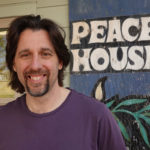
Peace House Community Board of Directors include:

Chair
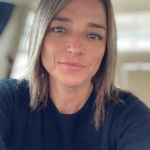
Vice-Chair

Secretary

Treasurer

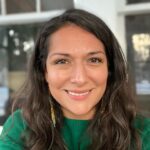
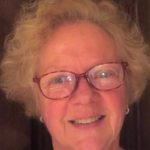


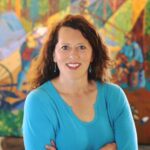

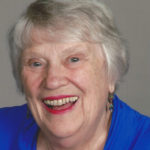
Honorary Member
History
Peace House Community grew out of one woman’s desire to meet the deepest emotional and relational need of the disenfranchised people she saw around her. Sister Rose Tillemans, a member of the Sisters of Saint Joseph of Carondolet, had run a free store on Nicollet Avenue for 10 years, but her conversations with her customers convinced her that they had deeper needs than just clothes or cookware. She realized that they need a safe place of community where they could share their thoughts, hurts and experiences with others who cared for them. On October 17, 1985, Sister Rose opened the door of Peace House Community at 510 East Franklin Avenue, a building that would quickly become known as ‘The living room on Franklin Avenue.’ For those who would never be invited over for dinner, it became a welcoming space to meet with friends and escape the chaos of everyday life.
Rose recognized that people’s spirits and souls needed to be nourished and healed. This became a ministry of listening to the stories of those who had no one to listen to them. It would provide a place for the most misunderstood and least loved in our society to call ‘home.’ It would be about what people need after they have been fed and clothed. Since the beginning Peace House Community has striven to understand and love each person.
In 1999, Peace House Community became a nonprofit corporation. At the same time, the building owner donated the property to Peace House Community. Although PHC was flourishing, it suffered a blow when Sister Rose died on July 5, 2002 at the age of 79. Determined to carry on her vision, the volunteers and board took over the operations and ensured that PHC continued to reach those most in need.
A new opportunity arose when a non-profit housing developer proposed building low-income housing on the land where PHC was located. After negotiations that benefits both agencies, PHC sold its building in exchange for a custom-built facility two blocks away. On July 12, 2013, Peace House Community opened its current facility at 1816 Portland Avenue S.
In 2017, PHC took another step in its development when the Board created the Manager position, moving the agency to a more professional structure. The Board hired PHC’s first Manager in April, 2018, bringing more consistency to the day-to-day operations while improving PHC’s ability to support other groups that supported its community members.
